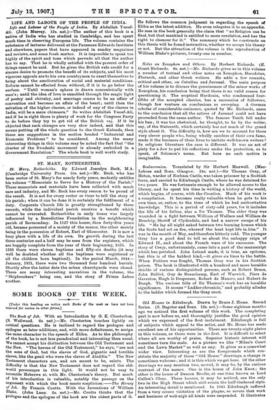SOME BOOKS OF THE WEEK.
[Under this heading we notice such Books of the week as have not been reserved for review in other forms.] The Book of Job. With an Introduction by G. K. Chesterton. (S. Wellwood. 6s. net.)—Mr. Chesterton touches lightly on critical questions. He is inclined to regard the prologue and epilogue as later additions, and, with more definiteness, to assign the same character to the speech of Elihu. As to the philosophy of the book, he is not less paradoxical and interesting than usual. We cannot accept his distinction between the Old Testament and the New. "The heroes of the Old Testament," he says, "are not the sons of God, but the slaves of God, gigantic and terrible slaves, like the genii who were the slaves of Aladdin." The New Testament characters are, and are meant to be, saints. The difficulty is that the New Testament does not regard the old- world personages in this light. It would not be easy to reconcile Hebrews xi. with Mr. Chesterton's theory. But much of his introduction is valuable, notably the passage on the argument with which the book meets scepticism.—The Heresy of Job. By Francis Coutts. With the Inventions of 'William Blake. (John Lane. 5s. net.)—Mr. Coutts thinks that the prologue and the epilogue of the book are the oldest parts of it. He follows the common judgment in regarding the speech of Elihn as the latest addition. He even relegates it to an appendix. He sees in the book generally the claim that " no Religion can be final, but that mankind is entitled to more revelation, and has the right to clamour for it." The summary which he constructs on this thesis will be found instructive, whether we accept his theory or not. But the attraction of the volume is the reproduction of William Blake's pictures, twenty-one in number.






































 Previous page
Previous page